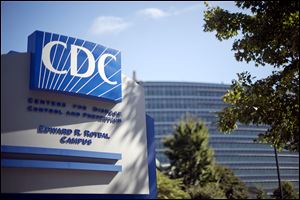
EDITORIAL
Obesity No. 1 public health issue
6/26/2017

About 10 percent of the world's population and 5 percent of the world's children are now classified as obese, according to the New England Journal of Medicine.
ASSOCIATED PRESS
One in every 10 people on the planet is now obese.
It gets worse: About 5 percent of the world’s children are among that obese population, with the United States having the highest level of childhood obesity among large nations.

The Centers for Disease Control and Prevention predict that one in every three Americans will have diabetes by 2050.
We should be shocked into action by statistics like those recently revealed in a study published by the New England Journal of Medicine. News of rising obesity rates and the health consequences that accompany obesity comes out fairly regularly. Yet somehow, we never seem moved enough to, well, move.
RELATED CONTENT: Draft public to stop trafficking ■ Trump administration shows bad faith on student loans ■ More Blade editorials
Obesity is an insidious health problem, creeping into our lives as our waistlines creep outward. We obsess over looking thin and being skinny for the sake of fashion. We should get fixated on our health. And we definitely should get fixated on our children’s health. It is nothing less than appalling that an entire generation is now at greater risk for serious health issues such as diabetes, heart disease, and cancers linked to being overweight or obese.
If reversing obesity trends were as easy as tackling the problem as individuals, we would have solved the problem by now. Clearly it is more complicated than people resolving individually to lose some weight.
An earlier study by the Centers for Disease Control and Prevention predicted that one in every three Americans will have diabetes by 2050 if trends continue.
Obesity has become a cultural and societal issue. We must fight it on that level. This means emphasizing walkable and bikeable neighborhoods. It means investing in parks and outdoor recreation. It means encouraging healthy eating in schools and addressing neighborhoods that are food deserts.
This is no longer a question of vanity or of dropping a few pounds to fit into those skinny jeans. This is about the health, and quality of life, for the next generation.